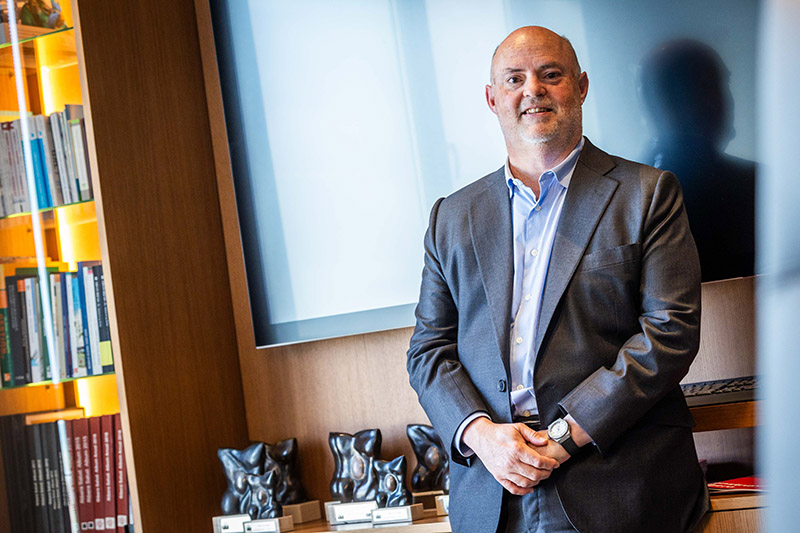This week, I had the privilege of participating in a major forum on innovation, the Portugal Healthcare Innovation Summit, as the president of Ribera and alongside the management team of Hospital de Cascais, a clear example of an innovative management model for Portugal and other countries. This forum was chaired by the Minister of Health, Manuel Pizarro, who explained the key aspects of the healthcare reform that will be implemented on January 1, 2024. Additionally, this forum also featured excellent representatives from the most prestigious public and private healthcare groups and institutions in Portugal.
Our sector is knowledge-based, and to innovate, we must share best practices to provide the best healthcare service to citizens. The Ribera group has always advocated for this idea of collaborative healthcare.
Below, I share the interview conducted with me by HealthNews, where they capture my vision on innovation and the role of managers in this process of change very well.
(Translation of the article, which you can read in Portuguese here)
Alberto de Rosa: «We are living in a time with many challenges, and doing nothing is no longer an option»
September 28th, 2023
This Wednesday, during the Portugal Healthcare Innovation Summit, Alberto de Rosa, president of the Ribera healthcare group, spoke with HealthNews about the future of medicine (hybrid, collaborative, and value-based) and the role of healthcare managers.
«Post-Covid, we are living in a very important moment in healthcare because, in addition to the traditional challenges of an aging population, chronic diseases, and new technologies, other problems have arisen, such as increased waiting lists, delays in diagnoses, and a lack of professionals. We are living in a time with many challenges, and the option of doing nothing no longer exists. Both governments and companies must face these challenges by seeking solutions. For me, these types of events are very relevant because I would say that we will move towards a medicine, in the coming years, that will have three fundamental elements,» said Alberto de Rosa.
Alberto de Rosa referred to hybrid, collaborative, and valuable medicine. In the first point, this means that «we will have to combine human presence, professionals, with the help that technology and artificial intelligence can give us to improve care for citizens.» Secondly, collaborative because «hospitals will have to communicate with primary healthcare, nursing homes, the social sector; but also the public sector with the private sector.» «We must all seek new 21st-century solutions for these challenges we face at this time.»
«Then, the third idea is valuable medicine. We have to provide value to citizens because today’s society is different from that of 30 or 40 years ago. There are more and more older people, alone, vulnerable, fragile, and we have to offer them solutions. In this sense, we will have to personalize care. For this, we will have to measure the situation of each person (all people are different) and move towards predictive models, population models. Rather than making big plans for everyone, we will have to make our unique plans,» he explained.
The president of Ribera, distinguished in the first edition of the «Joan Calafat Health Awards» with an honorary mention in healthcare management, agreed to HealthNews’ final request to speak directly to executives. He told us: «there are two or three ideas that, for me, are fundamental.»
«The first is: be open to change. We have to be innovative and, in the face of current problems, we cannot give answers from 40 or 50 years ago. (…) This is very important because I believe that in the next 20 years, health will undergo a significant transformation, with the concepts I mentioned, towards hybrid medicine, towards collaborative medicine, towards value-based and personalized medicine. Therefore, those who are starting now or those who are already working must have an open mind to innovation and transformation, because it will be necessary to adapt to all the challenges of society,» he said.
«The second idea, for me, is leadership. The great challenge is the cultural change among our professionals. In all this healthcare that is experiencing a moment of change and transformation, we have to lead this change and transformation. We must have leadership, convince our healthcare professionals, add our healthcare professionals to this process of change. This process of change, without professionals, will be a failure. Professionals are fundamental in this process of change. And thirdly, let’s never forget that we can talk about technology, about artificial intelligence, but this is a humanistic sector. We are talking about people we serve, and I like to say that we are people who serve people. The executives of the future must first take care of the professionals so that the professionals can take care of the people,» he concluded.
The Portugal Healthcare Innovation Summit event was organized by Bamberg Health, with the institutional support of the Bamberg Foundation, in a hybrid format: online and at the Hotel Eurostars Universal Lisbon.

